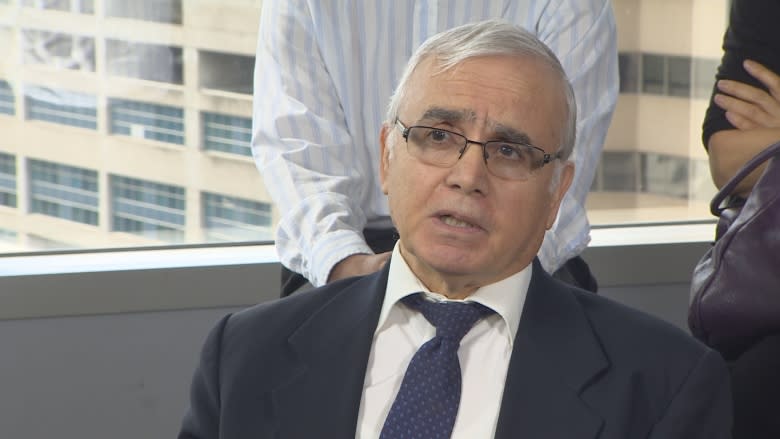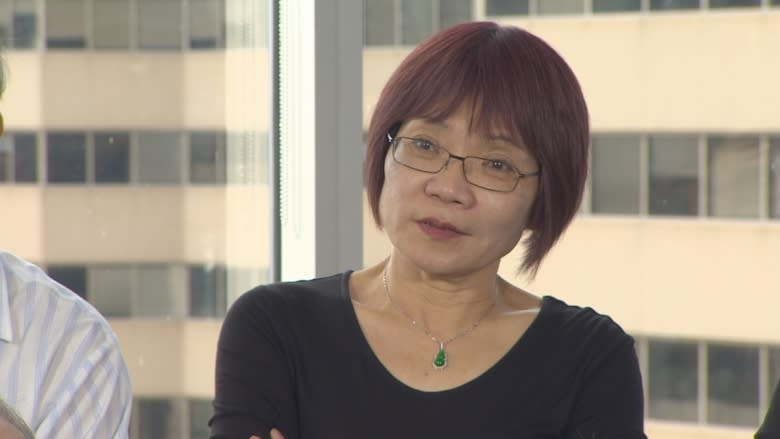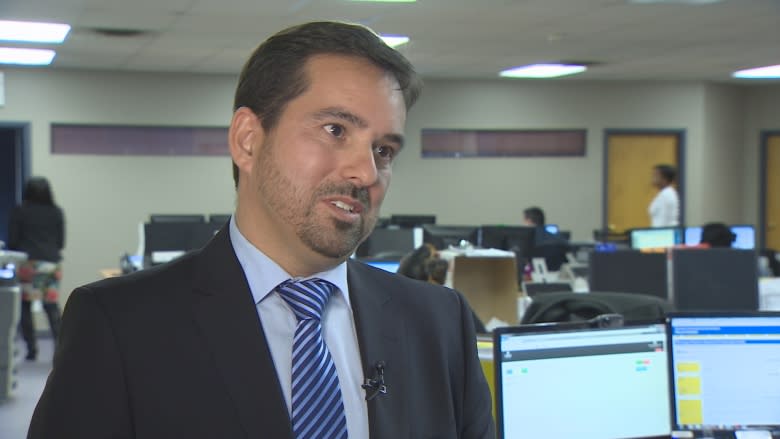Translation company doesn't pay or is slow to do so, say workers
A Mississauga translation company that does millions of dollars in business with public agencies and well-known corporations takes months to pay professional interpreters, or fails to pay them altogether, say dozens of people who have worked for the firm.
Faysal Mohamed, a Syrian-Canadian academic, became a certified interpreter when he couldn't find a teaching position.
He says cheques from Able came months late, and his calls to the company went unanswered.
"You call again. You call again. You send emails, nobody responds," Mohamed told CBC News.
"Of course your payments cannot be postponed. You resort to personal loans and this is a humbling experience. It puts you under stress especially not knowing when it's going to end."
He's just one of more than 40 freelance interpreters who have contacted CBC News alleging a pattern of late or non-payment for their work.
CBC News has interviewed 28 of them, many of whom are new Canadians who are unable to find work in the professions they've trained for, and have become certified interpreters as a new source of income.
They say when they try to collect on their invoices, they're being ignored by the company.
Some of the interpreters say they have had trouble paying rent or supporting their families.
Company provides services for corporations, agencies
Able Translations is one of the largest companies of its kind in Canada and has been in operation since 1994.
It provides translation and interpreting services throughout the province, to agencies such as the Workplace Safety Insurance Board, lawyers' and doctors' offices, hospitals, and many large insurance companies such as TD Insurance, The Co-Operators, and Allstate.
Hadeel Abu-Gharbieh, an Arabic interpreter, filed a court claim against Able this week, alleging she's owed more than $2,700 for work she did for Able's clients, but that Able hasn't paid since January 2015.
"It's not about the cheque anymore. It is about principle. Insulting people's intelligence this way is unacceptable. Unethical. And it has affected me morally more than financially."
The company told Abu-Gharbieh in September her cheques have been mailed. She says she's received nothing. Able told CBC News their "records don't show anything owing" to her.
Gladys Lau, a Chinese-language interpreter, says she was owed almost $8,400 for work dating back to October 2014.
"I call them. I actually went to the office but nobody will come and see you or talk to you. They say 'oh you're not supposed to see anybody. Send us a request. Send us an email.' So I send an email, I hear no response."
She received some money after filing a court claim against Able. Last week, after CBC News approached Able regarding the allegations, she received another $5,300.
Company acts after CBC News investigates
Henry Taing, a Vietnamese translator, told CBC News he spent months trying to collect $2,000 in payments, but says his phone calls and emails to Able went unanswered.
"When I went personally to meet somebody in the office, I was told by the receptionist that you cannot meet anybody," he said.
Last week, after CBC News took Taing's case to Able, he said he too received a cheque for most of the money he's owed.
Able says its interpreters are aware that it takes 60 to 90 days to get paid after providing services. Taing said at one point he'd been waiting up to a year.
Proz.com, the world's largest online job board and community forum for interpreters, says Able Translations has "been banned from posting jobs since May 27, 2013," because of the number of complaints from interpreters about non-payment.
Able Translations is owned and operated by Mississauga residents Wilson and Annabelle Teixeira. Wilson Teixeira is also a board member of the Ontario Lottery and Gaming Corporation.
The Teixeiras agreed to meet CBC News at Able's headquarters to discuss the allegations.
The owners also provided CBC News with three interpreters to interview. The three said they have provided services to Able for many years without any payment issues.
Wilson Teixeira, Able's president, said the complainants represent a very small portion of their roster of interpreters, whom the company calls suppliers.
"We do have over 3,500 suppliers, and the reality is that we would not be able to be in business if we did not have the support of the community at large that work with us and get payments on time," he told CBC News.
"Just like any other organization, sometimes we would have an issue and we do address those issues. And we do it in a timely manner, as long as we have that communication open with our suppliers."
66 Ministry of Labour complaints
However, Ontario's Ministry of Labour confirmed since 2012 it has received 66 separate complaints of non payment from people who worked for Able. In four cases, after the complaints, Able made a voluntary payment.
In most cases, the interpreters were told the ministry did not have the authority to investigate, because the interpreters are "independent contractors" and not company employees.
Nineteen cases are still being "processed," the ministry said.
In Toronto and Brampton alone, CBC News located nine small claims court cases filed against Able Translations by interpreters alleging non payments totalling more than $30,000. In some cases, people claimed they hadn't been paid in many months.
In some of the small claims cases, Able defended itself by saying the company had "accounting difficulties," and "clerical errors."
They also blamed "unforeseen circumstances beyond their control."
In every case that CBC located, Able either agreed to settle, sometimes for a slightly reduced amount, or was ordered to pay.
Asked if there was a pattern of complaints against the company, Teixeira insisted many disputes come from billing errors, or work that's poorly performed.
"A lot of these incidents are for amounts that do not match our records, or are due to the fact that the appointments were not fulfilled to the expectations of our clients. We have payment terms within our suppliers. Some people may not agree with the payment terms that we have."
Ahmed Hafez worked in Able's head office until July. He says he left in part because of the number of calls he received from unpaid interpreters.
"Every day I had to talk to people and listen to their sufferings and how important it was for them to get paid. And I couldn't do anything for them," he told CBC News.
"People keep working in the hope that they'll get paid eventually. You have no other option."
Have a tip? Email John Lancaster at john.lancaster@cbc.ca.




